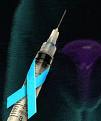Even if you've had HPV cervical cancer vaccine, Pap smears are still necessary

Fredricksburg, VA
SINCE its introduc- tion in 2006, the human papilloma virus (HPV) vaccine has been given to millions of girls and women between the ages of nine and 26. As a result, the incidence of abnormal Pap smears is already on the decline. And the number of follow-up tests--such as cervical biopsies--and treatments--like cryotherapy--is also declining.
This is great news, but it shouldn't lull women into a sense of complacency.
HPV, as the name indicates, is a virus. It is passed from one person to another by direct contact, like sexual intercourse.
Once a person is exposed to the HPV virus, one of three things can happen:
The immune system may get to work clearing the virus from the body, and it will never cause any problems.
The virus may enter the cells of the external genital organs like the vulva, vagina or cervix and just lie dormant, causing no detectable disease for an indefinite period of time.
Or, the virus may cause changes to the cells it inhabits that can lead to pre-cancer or, over time, cancer.
PAP SMEAR POWER
There are about 40 different types of HPV that can infect the human genital tract. The current HPV vaccine protects against only four: the two types that cause approximately 90 percent of genital warts, and the two types that cause 70 percent of cervical cancers.
That means that this vaccine does not protect against HPV types that cause the other 30 percent. There's a new HPV vaccine coming down the pike that will cover more types, but it still won't cover all 40.
It's important to understand that just because you've had the HPV vaccine, this doesn't mean that you can be lax about having Pap smears. Even for the vaccinated group of women, Pap smears are still a very important tool for the early diagnosis of pre-cancer and cancer of the cervix.
So, what are the most recent recommendations for cervical cancer screening?
First of all, Pap smear testing should begin at least three years after the onset of sexual activity or at 21 years of age, whichever comes first. After this, Pap smear testing should occur yearly until the age of 30.
Read more, "Even if you've had HPV cervical cancer vaccine, Pap smears are still necessary"
Labels: Cervical Cancer Awareness, Cervical Cancer Vaccine, Pap Smear Test

0 Comments:
Post a Comment
<< Home